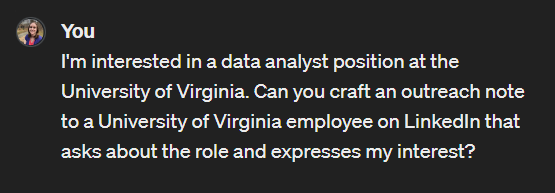A Financial Review article asked, “Is this one word the shortcut to detecting AI-written work?”
What was the word? Delve.
ChatGPT even joked about this on Twitter, saying “Don’t mind me just doing some delving today.”

This made me wonder what other words and phrases are overused by ChatGPT. Below is a list of words and phrases that ChatGPT overuses, based on my interactions with ChatGPT.
Does this mean you can’t use these words or phrases? Of course not!
Does this mean any text with the word “delve” was AI-generated? Nope! I know people who love to use these words in their writing. And that’s fine!
But it’s good to be aware of these words because they tend to be mechanical and vague. If you are using too many of them, your text may sound like it was AI-generated.
Transitional words overused by ChatGPT
- Accordingly
- Additionally
- Arguably
- Certainly
- Consequently
- Hence
- However
- Indeed
- Moreover
- Nevertheless
- Nonetheless
- Notwithstanding
- Thus
- Undoubtedly
Adjectives overused by ChatGPT
- Adept
- Commendable
- Dynamic
- Efficient
- Ever-evolving
- Exciting
- Exemplary
- Innovative
- Invaluable
- Robust
- Seamless
- Synergistic
- Thought-provoking
- Transformative
- Utmost
- Vibrant
- Vital
Nouns overused by ChatGPT
- Efficiency
- Innovation
- Institution
- Integration
- Implementation
- Landscape
- Optimization
- Realm
- Tapestry
- Transformation
Verbs overused by ChatGPT
- Aligns
- Augment
- Delve
- Embark
- Facilitate
- Maximize
- Underscores
- Utilize
Phrases overused by ChatGPT
- A testament to…
- In conclusion…
- In summary…
- It’s important to note/consider…
- It’s worth noting that…
- On the contrary…
- This is not an exhaustive list.
Examples of data analysis phrases overused by ChatGPT:
- “Deliver actionable insights through in-depth data analysis”
- “Drive insightful data-driven decisions”
- “Leveraging data-driven insights”
- “Leveraging complex datasets to extract meaningful insights”
Other signs that text may have been written by ChatGPT:
- Overly complex sentence structures
- An unusually formal tone in text that’s supposed to be conversational or casual — or, an overly casual tone for a text that’s supposed to be formal or business casual
- Unnecessarily long and wordy
- Vague statements
Example 1: Ask ChatGPT to write a recommendation letter.
I asked ChatGPT to write a recommendation letter for a coworker applying for an event planner job at Eventbrite.



What are some signs that this text was generated by ChatGPT?
- It is vague and wordy, without concrete examples: There aren’t any specific ways that my coworker helped with events.
- There are too many adverbs, making it sound inauthentic and not human: “enthusiastically,” “closely,” “consistently,” “flawlessly,” “efficiently”
- Some words and phrases aren’t used often in human-written text, such as: “professionalism,” “furthermore,” “meticulous attention to detail”
Example 2: Ask ChatGPT to write a data analyst cover letter.
I asked ChatGPT to write a data analyst cover letter. I provided some made-up details, saying I’m applying for a data analyst role at Eventbrite and have 2 years of work experience as a Google data analyst.



What are some signs that this text was generated by ChatGPT?
- Vague, meaningless phrases: “I am confident in my ability to contribute effectively to your team and drive insightful data-driven decisions”, “leveraging complex datasets to extract meaningful insights”, “delivering actionable insights through in-depth data analysis,” “demonstrating strong problem-solving skills”, “leveraging data to drive business outcomes”
- No specific examples of data projects, just vague references to “dynamic visualizations and dashboards.”
- Overuse of adverbs that don’t add any meaning to the text: “effectively,” “efficiently,” “successfully,” “cross-functionally”
- Ends with “Warm regards”
Example 3: Ask ChatGPT to write a LinkedIn outreach note.
I asked ChatGPT to help me write a LinkedIn note to a University of Virginia employee, expressing interest in a data analyst position.


What are some signs that this text was generated by ChatGPT?
- The subject line is weirdly formal: “Inquiry about Data Analyst Position at UVA”
- Words that aren’t frequently used in human-written text: “keen,” “dynamic,” “inquiry”, “deriving”
- Vague, meaningless phrases: “exciting work being done at your institution,” “passion for deriving insights from data”, “dynamic team like yours”
- No specifics about the current job or projects, and only a vague reference to a “background in data analysis.”
- The University of Virginia is a big place, but this text doesn’t specify a particular unit on campus.
Example 4: Ask ChatGPT to write an email about data analysis findings.
I asked ChatGPT to draft an email to stakeholders about the results of a data project.



What are some signs that this text is generated by ChatGPT?
- Meaningless adverbs that are over-used by ChatGPT: “additionally,” “consistently,” “effectively”, “strategically”
- Uses the word “delve”
- Unnatural greeting and sign-off: the email starts with “Dear Stakeholders” and ends with “Best regards.” If written by a human, the names of the people would be listed at the beginning.
- Long, vague sentences such as “highlights the importance of concise and focused messaging,” “present valuable opportunities for optimizing…”, “I look forward to collaborating with you to leverage these learnings effectively in our future marketing endeavors”, “delve deeper into the implications of this analysis”
Example 5: Ask ChatGPT to write your resume summary.
I asked ChatGPT to write a resume summary for me, including a few details about my current job and technical expertise.


What are some signs that this text was generated by ChatGPT?
- Vague, meaningless words and phrases: “results-driven,” “solid foundation,” “actionable insights,” “innovative solutions,” “strong collaborator,” “drive efficiency,” “complex challenges,” “track record”
- No specific examples of certifications or data projects.
- Strange phrasing: “University of Virginia ecosystem,” “leveraging 4 years experience”
Final Thoughts
Why does ChatGPT text sound bad? It’s as though you asked a million people to respond to your prompt, and ChatGPT gives you the “average” of all their responses. Its output will be generic and vague. ChatGPT won’t give you the best word for each scenario, it will just give you the most commonly used one.
There’s no foolproof way to detect AI-written text, even if you use tools available today (like GPTZero.) AI software could always create text with the specific intent of evading these kinds of detectors. Also, AI tools are always improving, so there is an arms race between ChatGPT text detectors and detector-evaders.
As ChatGPT evolves, it can’t hurt to avoid the words and phrases listed in this article. To make your text sound more human, use specific, meaningful words, and specific examples. For example, you can ask ChatGPT to generate draft text, then interact with ChatGPT to edit the text and make it sound more authentic.


